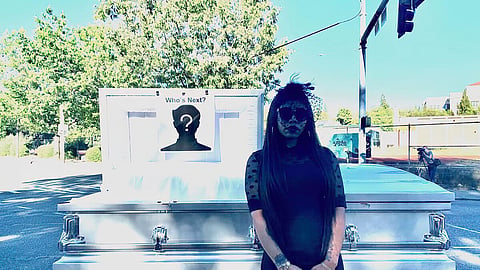OPINION: 911! We Must Act Quickly to Save Our Beloved Community
Gun Violence Is an Infectious Disease
by Lynniah Grayson
Everyone lost to gun violence is someone's beloved. Beloved is a multi-media campaign exploring gun violence in-depth in four phases: The Problem of gun violence as a symptom of illness (or infection) caused by systemic inequality; The History of gun violence, root causes, and local and national data trends. The Solutions to end gun violence including King County Public Health's regional approach to gun violence prevention and treatments; and finally, the ideation of a world without gun violence, The Beloved Community. The Beloved project is brought to you in partnership with Seattle Office of Arts & Culture Hope Corps program, King County's Public Health team, Converge Media, Black Coffee Northwest, Toybox Consulting, Creative Justice, The Facts Newspaper, Forever Safe Spaces, Northwest African American Museum, Presidential Media, and the South Seattle Emerald.
I once heard someone say, "It won't be long until Black men in America are extinct." That statement shook me to my core, and new thoughts flooded my mind around the notion that it might become true.
Could it be that mass incarceration and gun violence made them believe this?
The nation's leading cause of death for Black men 44 and younger is homicide — not heart disease, but homicide. Think about that. The King County Prosecuting Attorney's Office's 2021 "Shots Fired" report provides us with annual gun violence data that shows a terrifying increase year over year, with the demographics — Black people accounting for 50% of shooting victims — remaining the same. It's important to note that 85% of these shooting victims are males. The data does not show what percentage of these males were fathers, husbands, and providers.
As a community leader, and one who has been impacted by gun violence since adolescence, with the most recent loss in the form of a family member, I have become an advocate for mothers who have experienced such tragedy and children who now must live with enormous adversity for the rest of what we hope to be a long, healthy life. I do this work via Resilient In Sustaining Empowerment (RISE), where we focus on restoring families experiencing the impacts of gun violence through a holistic approach that intersects with public health.
If we are going to look at solutions, we must first identify the root cause of the problem. Gun violence is an issue that has impacted generations of families for decades. Where I am from, it is not unusual for a family to include third- and fourth-generation survivors, victims, or even perpetrators of gun violence.
The federal government has acknowledged that gun violence is a public health crisis. Many counties and states have declared gun violence a public health crisis and have sprung into addressing this health risk like how they responded to COVID-19. And gun violence is an infectious disease. It is a complicated situation affecting humans in one or more geographic areas. Health crises generally significantly impact community health, loss of life, and the economy. We are all impacted by gun violence — directly and indirectly.
In terms of impact, I must take a moment to draw your attention to our children and the consequences of exposure to violence on child brain development. Children and youth exposed to chronic trauma can experience inhibited brain development. If unaddressed, typically due to lack of resources, childhood mental health problems will likely continue to grow, and this will show up in all areas of children's lives.
My commitment to this work stems from being severely impacted for the last 16 years of my life. Gun violence has cut my high school class down to half! Gun violence has harmed my household on so many levels. We lost a family member recently in the form of my Daughter's father to gun violence; I went into preterm labor at five months due to gun violence's mental health impacts on my body. Our community has seen tragedy after tragedy at a rapid speed, with evidence of enormous increase and lacking any signs of a sustainable decrease — and without adequate support and sound investment.
I want people to know that our community has unaddressed generational and historical trauma on top of trauma inflicted by social conditions, ACEs (adverse childhood experiences), and so much more. Add the direct impact of gun violence, and it all becomes a recipe for disease, disability, homelessness, social problems, health risk, and disrupted neurodevelopment that ultimately results in early death. Children are dying, and mothers are suffering; Black men are vanishing. There is an intense and urgent need to save our beloved community. We must act quickly.
With Love,
Lynniah Grayson, Founder and Executive Director of Resilient In Sustaining Empowerment
The South Seattle Emerald is committed to holding space for a variety of viewpoints within our community, with the understanding that differing perspectives do not negate mutual respect amongst community members.
The opinions, beliefs, and viewpoints expressed by the contributors on this website do not necessarily reflect the opinions, beliefs, and viewpoints of the Emerald or official policies of the Emerald.
Featured Image: Lynniah Grayson poses next to a casket at the "Who's Next? We Want to Live" event in the South End in 2020.
Before you move on to the next story …
The South Seattle Emerald™ is brought to you by Rainmakers. Rainmakers give recurring gifts at any amount. With around 1,000 Rainmakers, the Emerald™ is truly community-driven local media. Help us keep BIPOC-led media free and accessible.
If just half of our readers signed up to give $6 a month, we wouldn't have to fundraise for the rest of the year. Small amounts make a difference.
We cannot do this work without you. Become a Rainmaker today!
Help keep BIPOC-led, community-powered journalism free — become a Rainmaker today.


